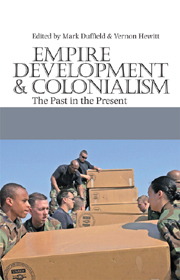Book contents
- Frontmatter
- Contents
- Acknowledgements
- Notes on Contributors
- Introduction
- 1 The Exceptional inclusion of ‘Savages’ & ‘Barbarians’
- 2 Empire, International Development & the Concept of Good Government
- 3 Empire: a Question of Hearts?
- 4 ‘Conflict-Sensitive’ Aid & Making liberal Peace
- 5 Development, Poverty & Famines
- 6 Plain Tales from the Reconstruction Site
- 7 The International Politics of Social Transformation
- 8 Liberal Interventionism & the Fragile State
- 9 Freedom, Fear & NGOs
- 10 Theorising Continuities between Empire & Development
- 11 Spatial Practices & Imaginaries
- 12 Decolonising the Borders in Sudan
- 13 ‘Individualism is, Indeed, Running Riot’
- Index
4 - ‘Conflict-Sensitive’ Aid & Making liberal Peace
Published online by Cambridge University Press: 05 February 2013
- Frontmatter
- Contents
- Acknowledgements
- Notes on Contributors
- Introduction
- 1 The Exceptional inclusion of ‘Savages’ & ‘Barbarians’
- 2 Empire, International Development & the Concept of Good Government
- 3 Empire: a Question of Hearts?
- 4 ‘Conflict-Sensitive’ Aid & Making liberal Peace
- 5 Development, Poverty & Famines
- 6 Plain Tales from the Reconstruction Site
- 7 The International Politics of Social Transformation
- 8 Liberal Interventionism & the Fragile State
- 9 Freedom, Fear & NGOs
- 10 Theorising Continuities between Empire & Development
- 11 Spatial Practices & Imaginaries
- 12 Decolonising the Borders in Sudan
- 13 ‘Individualism is, Indeed, Running Riot’
- Index
Summary
Introduction
The notion of ‘conflict sensitivity’ has become increasingly integral to the provision of international humanitarian and developmental assistance to countries afflicted by political and communal violence. On the one hand, the principle of ‘do no harm’ (Anderson 1999) has been taken up by donors and agencies with the ethos that efforts to administer humanitarian relief or facilitate development should not exacerbate existing tensions or create new ones. On the other hand, going actively beyond this and driven by the now common, if contested, wisdom that underdevelopment and poverty lead to violence (OECD 2001), donors have sought to actively use aid to intervene in ‘internal’ conflicts in order to end ongoing violence, ameliorate its perceived causes and, thereby, to ‘build peace’. While ‘conflict sensitivity’ is an evolving concept with different interpretations (Barbolet et al. 2005), its essence is captured in a definition put forward by a coalition of NGOs, drawing on experiences from different conflict sites. Conflict sensitivity is the capacity of an actor to:
understand the (conflict) context in which it operates; understand the interaction between its operations and the (conflict) context; and act upon the understanding of this interaction in order to avoid negative impacts and maximise positive impacts on the (conflict) context.
(Resource Pack 2004, emphasis added)The imperative for ‘conflict sensitivity’ thus comes from the laudable demand that external actors should not exacerbate conflict and, indeed, should actively work to ameliorate both its effects and its causes.
- Type
- Chapter
- Information
- Empire, Development and ColonialismThe Past in the Present, pp. 59 - 73Publisher: Boydell & BrewerPrint publication year: 2009



